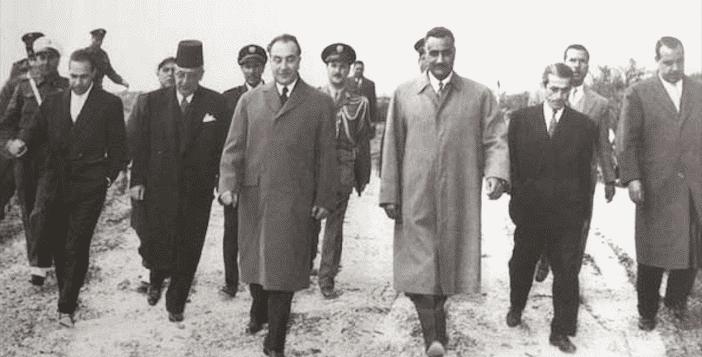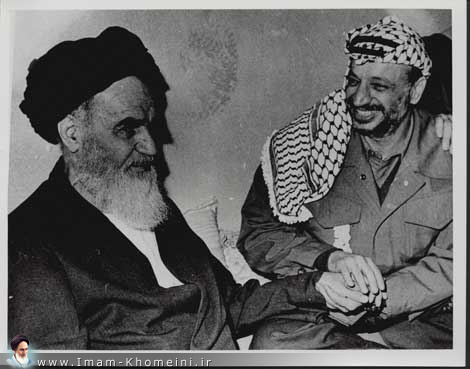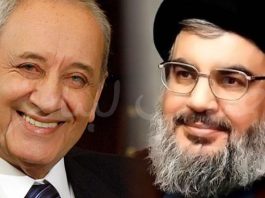Will We Witness a Return to Temporary Solutions?
Colonel Charbel Barakat/November 12, 2024
(Freely translated from Arabic and quoted by Elias Bejjani, editor and publisher of the LCCC website)
Introduction
هل سنشهد عودة التجارب السابقة للحلول المؤقتة
الكولونيل شربل بركات/12 تشرين الثاني/2024
مر لبنان المستقل بأربع تجارب سابقة في التعامل مع الارهاب وداعميه. ما جعله يفقد حصانته ودوره شيئا فشيئا، ويفقد خصائصه في تجربة الحوار والعيش المشترك بين مختلفين، إن من حيث الأصل والمنشأ، أو من حيث الدين والمذهب، وحتى المعتقدات الفلسفية والتوجهات السياسية. فقد مر بتجربة الناصرية يوم قرر عبد الناصر توسيع سيطرته صوب سوريا ولبنان لقطع الطريق على تحويل مرفأ بيروت مركزا تجاريا ينافس قناة السويس في تجارة أوروبا الغربية مع الخليج، فمد يده على سوريا، ومن ثم تدخل واثار الفتنة في لبنان سنة 1958، لقلب النظام وتحويله تابعا لما أسماه يومها “الجمهورية العربية المتحدة”، ما أضطر الأسطول السادس للقيام بانزال في بيروت لوقف مخططه وفرض سيطرته على خطوط التجارة العالمية في البحر المتوسط ومنه. وقد كان قيامه بتأميم القناة تسبب بعملية الانزال المشتركة من قبل فرنسا وانكلترا وتدخل اسرائيل في حرب 1956. ولكنه، بعد رفع يده عن سوريا كليا، تحوّل إلى اليمن وبدأ بخلق القلاقل للسعوديين.
أما التجربة الثانية فكانت مع عرفات في حرب لبنان التي سمّيت “حربا أهلية”، بينما هي نتيجة سيطرة فائض القوة الفلسطينية على البلد، ودعم سوريا لها للتمدد وتهديد دولة لبنان. وكاد دخول اسرائيل سنة 1978، الذي أنتج القرار الدولي 425 وملحقه 426، أن ينهي سيطرة عرفات لولا تدخل سوريا أيضا لمنع التنفيذ.
المرة الثالثة كانت بعد حرب 1982 التي وصلت فيها اسرائيل لبيروت وطردت عرفات وزمرته من لبنان والجيش السوري من العاصمة، ولكن في هذه المرة أيضا، كان الخوف من الضغط السوري على الرئيس الجميل منعه من ابرام اتفاق السابع عشر من ايار، الذي كان أُقرّ من قبل الحكومة ومجلس النواب، فتسبب ذلك بقيام حزب الله والعودة لنفس نغمة الارهاب وداعميه.
أما التجربة الرابعة فكانت حرب 2006، التي قام بها حزب الله، باشراف قاسم سليماني قائد فيلق القدس الإيراني، وأنتجت القرار الدولي 1701، الذي دعا لسحب المسلحين من جنوب الليطاني، وتنفيذ قرار مجلس الأمن الدولي 1559، وهو يطلب تجريد المليشيات في لبنان من سلاحها وحصر السلاح بالدولة اللبنانية، والقرار 1680 الذي يمنع دخول أي سلاح عبر الحدود السورية. ولكن هنا أيضا لم تنفّذ القرارات من قبل الحكومة اللبنانية، التي رفضت أن يكون التنفيذ تحت البند السابع، ما أعطي التنظيم الارهابي فرصة أخرى للبقاء والاستمرار واعادة بناء ترسانته وتحصيناته، وأدى إلى أن يعلن هو الحرب ابتدأ من الثامن من تشرين الأول 2023، بشكل مضبوط في البدء وامتدادا حتى أيلول 2024، حيث تفجرت ولا تزال مفاعيلها تتفاقم يوما بعد يوم.
الكلام اليوم عن تدخلات دولية لمنع تطور الأحداث نحو حرب أقليمية بين نظام الملالي في إيران ودولة اسرائيل، التي عانت من هجمة إرهابية كبيرة، منذ عملية ما سمي “طوفان الأقصى” في السابع من تشرين أول 2023، والذي أدى إلى مقتل حوالي الف مواطن اسرائيلي واختطاف ما يزيد عن الثلاث مئة، عدى عن الفوضى التي أحدثها اجتياز الحدود بين القطاع واسرائيل، والتي لم تكن عملية سهلة بالنسبة للتجهيزات المستعملة في مراقبة السياج الحدودي لمنع ذلك. وقد أدت عمليات الجيش الاسرائيلي في غزة لتدمير الكثير من المنشآت والأبنية، وتهجير السكان مرة إلى الجنوب وأخرى إلى الشمال، كما أدى القصف والعمليات العسكرية، بحسب وسائل الاعلام، إلى مقتل ما يقارب الأربعين ألف من الفلسطينيين. وبالرغم من كل ذلك لم تستسلم حركة حماس التي فقدت كل قادتها وأغلب مقاتليها، وذلك لأن الداعم الرئيسي لها أي نظام الملالي في إيران لا يزال يسهم في إعطائها النفس، كما جرى ويجري مع حزب الله في لبنان.
إن مراجعة مسببات الحرب الحالية، والتي تستند إلى التجارب الأربعة السابقة، يدفعنا إلى التأكيد بأنه وفور التوصل إلى أي نوع من وقف النار بدون تحميل المسؤولية لداعمي الأرهاب بشكل قاسي ومؤلم، سوف يكون سببا لحرب أخرى أصعب من التي تجري الآن، وبالتالي على المجتمع الدولي والمسؤولين في المنطقة عدم القبول بأي حل مؤقت يسمح ببقاء الارهاب واستمراره، وبخروج داعميه من المعركة بدون تحمّل الثمن الذي يمنع من اعتماد نفس الوسيلة في المستقبل.
فلو أن الولايات المتحدة تصرفت مع عبد الناصر في 1958 بقساوة مباشرة، وحمّلته ونظامه مسؤولية الحرب في لبنان، لما كان تجرّأ على الذهاب إلى اليمن وتحميل اليمنيين والسعوديين والمصريين نتائج حربه وقراراته التوسعية الخاطئة، وحتى قراره الفاشل بشن حرب 1967، ولكان اللبنانيون، الذين تاجرت بهم يومها المخابرات السورية المصرية، تنبّهوا لخطورة الوضع، وتحسّبوا في 1975 لعدم الانخراط في نفس الخطأ والوقوف مع عرفات لهدم الدولة. ولو أن لبنان والمجتمع الدولي تصرفا بحزم مع عرفات وتهدد نظام الأسد لعدم التدخل، وسار اللبنانيون بحسب توصيات اللجنة النيابية السداسية لتنفيذ القرار الدولي 425، لكانت المشاكل في لبنان انتهت منذ 1978، ولو أن الرئيس الجميل ابرم اتفاق السابع عشر من ايار سنة 1983 وفرض تطبيقه بمساعدة القوى المتعددة الجنسية وقبل انسحاب اسرائيل، وبتهديد مباشر من قبل هؤلاء للنظام السوري، لما تعرّض لبنان لكل المشاكل طيلة أربعين سنة، ولما نشأ حزب الله أصلا.
في كل مرة يتسامح فيها اللبنانيون والمجتمع الدولي مع الارهاب، يتشجّع كل من له رغبة في خلق مشكل باعتماد هذه الوسيلة لاثبات وجهة نظره وفرض رأيه، لأنه يعرف بأن لا عقاب مقابل ما يقوم به من ضرر على الدول والشعوب المستهدفة، وبأنه في حال خسر المعركة فإنه يخسر بعض الأدوات والأموال ليس إلا، ولا يلحق به أو بنظامه ضرر كاف، ولو أن نظام الأسد عاد وانتهى بتحمّل عواقب المآسي التي صنعها ونال عقاب السماء لا الأرض، ولكنه كان يجب أن يعرف والآخرين بأن قيامه باستعمال الارهاب وسيلة لقهر الناس لا يمر ولا يقبل، وعندها لما كان تجرأ نظام الملالي لاستعمال نفس الطريقة، ليس في لبنان فقط، وإنما في الكثير من دول المنطقة.
من هنا نأمل هذه المرة، بأن ينال نظام دولة الفقيه العقاب الملائم، وهو الذي لم يترك بلدا في الشرق الأوسط يعيش بدون قلق من عمليات الأرهاب ضد أبنائه، لا بل ضد العالم بأجمعه وفي مناطق كثيرة ودول عديدة. فتبديل النظام في طهران ليس بالكافي، ولو أن الشعب الإيراني يستحق أن يغيّر بنفسه هذا النظام الردئ، ولكن يجب أن يعرف كل متشاوف ومتجبّر لا يخاف الله، بأنه سينال عقابا عادلا عما يقوم به، خاصة عندما يستعمل أمواله وأسلحته، ويغرس في نفوس بعض الضعفاء أفكار الحقد وسموم التفرقة، ويستعملهم للسيطرة على الآخرين.
على اللبنانيين، الذين سلّموا بافكار مخابرات عبد الناصر ومن ثم عرفات والأسد وأخيرا الحرس الثوري، ولا يزال بعضهم يعيش وهم الدولة الواسعة؛ عربية كانت أم أممية، شيعية كانت أم سنية، بعثية أم قومية لا فرق، فإن كل هذه النظريات لا تعرف خصائص لبنان وقوته، ولم تعمل إلا لاضعافه واستعمال أبنائه وقودا لمشاريعها. فلينتظم الشيعة اليوم صفا واحدا ضد ما يسمى بحزب إيران ومعهم اللبنانيين كلهم، ويوقفوا جماعته عند حدهم، فكفانا متاجرة بدم الحسين وسيرة علي وآل البيت، وكفى قتالا ضد جيراننا وتحفيذا على الشر والحقد، فبيوتنا تهدمت وأولادنا قتلوا وأئمتنا دفنوا مع مشاريعهم التوسعية، ولا نزال نقاتل ونعاني من التشرد والياس، ولا مطالب عند من نسميه “العدو” سوى أن نرتدع عن قتال الآخرين، ونستمع لصوت الضمير، ونجرب تسليم أمرنا للدولة، وانتقاء حكاما صالحين لا يريدون قتل أبنائنا ولا سرقة جيراننا ولا محاربة أحد. ولتكن دعوتنا للسلام والاستقرار والبناء والتعاون والحياد عن كل ما يضر بالناس، ولنكن عنوانا للتفاهم والعيش بكرامة ولنطلب لغيرنا أقله ما نريده لنفوسنا.
Will We Witness a Return to Temporary Solutions?
Colonel Charbel Barakat/November 12, 2024
(Freely translated from Arabic and quoted by Elias Bejjani, editor and publisher of the LCCC website)
Introduction
Colonel Charbel Barakat, a retired Lebanese Army officer, historian, terrorism expert, and author of numerous works on Lebanon, the Iranian regime’s schemes, and jihadist movements, has testified multiple times before the U.S. Congress on critical issues, including Iranian and Syrian terrorism, the Syrian occupation of Lebanon, jihadist threats, and the pursuit of Middle East peace.
In his analysis of today, Colonel Charbel Barakat calls on the Lebanese people to break free from the cycles of influence and domination imposed upon them by foreign powers—from Nasser’s Arab nationalism to Arafat’s Palestinian agenda, Assad’s Syrian dominance, and now Iran’s Revolutionary Guard through Hezbollah. He asserts that the Lebanese must choose unity over division and prioritize their homeland and people above all foreign schemes. Barakat warns that ideological ambitions, whether Arabist, Islamist, Shiite, Sunni, Baathist, or nationalist, have only served to weaken Lebanon by turning its people into fuel for other nations’ conflicts. Quoting his analysis, Barakat states, “The Lebanese, who once embraced the intelligence operations of Abdel Nasser, then Arafat, Assad, and now the Revolutionary Guard, must realize that these doctrines neither understand Lebanon’s unique strength nor value its qualities.” He urges the Lebanese, particularly the Shiite community, to stand firm against what he terms “Iran’s Party,” pushing for the cessation of divisive rhetoric and calls for violence against neighbors. He declares that “our homes are destroyed, our children are killed, and our leaders are buried along with their expansionist projects.” He calls on the Lebanese to instead embrace unity, neutrality, and peace, aiming to build a dignified and stable society where they can live honorably and desire for others what they seek for themselves. Barakat’s words echo a clear message: the path forward for Lebanon lies not in serving external agendas but in fostering peace, stability, and unity within its borders.
“Will We Witness a Return to Temporary Solutions?”
Colonel Charbel Barakat/November 12, 2024
Colonel Charbel Barakat began by analyzing Lebanon’s past struggles, emphasizing that “Lebanon has faced four main phases in dealing with terrorism and its supporters, each time leading it to lose its immunity and its unique role as a place of coexistence.” He stated that these experiences caused Lebanon to gradually lose its qualities as a hub for dialogue and a model of coexistence among diverse groups in terms of origin, religion, sect, philosophy, and political orientation.
He explained that Lebanon’s first experience was with Nasserism, during which Egyptian President Gamal Abdel Nasser attempted to expand his influence into Syria and Lebanon, aiming to undermine Beirut’s port as a commercial hub that could rival the Suez Canal. “Nasser’s efforts to dominate the region,” he noted, “led him to intervene in Lebanon in 1958, seeking to overthrow the government and incorporate Lebanon into his so-called ‘United Arab Republic’.” This effort was countered by the U.S. Sixth Fleet, which intervened to halt his plans and protect the Mediterranean’s trade routes.
Barakat observed that “Nasser’s ambition to nationalize the Suez Canal and his military actions in Yemen ultimately caused his downfall.” He added, “Following his withdrawal from Syria, Nasser turned his attention to Yemen, creating chaos and entangling Saudi Arabia in a protracted conflict.”
Barakat continued by identifying the second phase as “Lebanon’s experience with Yasser Arafat and the Palestinian militants, leading to the Lebanese Civil War, which was not truly civil but rather driven by Palestinian overreach.” He explained that Arafat, with Syrian support, sought to dominate Lebanon. “In 1978, Israel’s intervention almost curbed Arafat’s ambitions through UN Resolutions 425 and 426, but Syrian interference prevented the full implementation of these resolutions.”
The third experience, he stated, occurred after the 1982 Israeli invasion that reached Beirut, expelling Arafat and Syrian forces from the capital. He noted, “Fear of Syrian pressure on President Amin Gemayel prevented Lebanon from finalizing the May 17 Agreement,” which had been approved by the government and parliament. This, he said, “enabled Hezbollah’s formation and reignited terrorism with its supporters.”
Barakat pointed out that the fourth phase unfolded during the 2006 war, “instigated by Hezbollah under the direction of Qassem Soleimani, commander of Iran’s Quds Force.” This conflict led to UN Resolution 1701, which called for the disarmament of militias and the exclusive control of weapons by the Lebanese state. “Despite these resolutions,” he explained, “Lebanon’s refusal to place the implementation under Chapter VII gave Hezbollah yet another chance to rebuild and expand its arsenal, ultimately leading to the escalation of the current conflict.”
He cited recent global interventions aimed at preventing a regional war between Iran and Israel, emphasizing that “the October 7, 2023, attack known as the ‘Al-Aqsa Flood,’ which killed around 1,000 Israelis and resulted in over 300 kidnappings, has escalated tensions.” He added, “Despite the extensive operations conducted by the Israeli army in Gaza, including the displacement of residents and substantial casualties, Hamas has not surrendered, sustained by the Iranian regime’s support, much like Hezbollah in Lebanon.”
Reflecting on these events, Barakat warned, “History teaches us that achieving only temporary ceasefires without holding the true supporters of terrorism accountable leads inevitably to worse conflicts in the future.” He urged the international community and regional officials to avoid any compromise that would permit terrorism to persist. “If the United States had held Nasser responsible for his actions in 1958,” he observed, “he might not have dared to pursue conflict in Yemen or his failed war in 1967, and Lebanon might have recognized the dangers early on.”
Barakat further elaborated, “If Lebanon and the international community had firmly addressed Arafat’s actions and warned Syria against intervention, and if the May 17 Agreement had been enacted in 1983 with the support of multinational forces, Hezbollah might never have come into existence.” He concluded, “Every time the Lebanese people and the international community allow terrorism to go unpunished, it encourages others to use similar tactics to impose their views, as they realize there are no serious consequences.”
He emphasized, “The time has come for the regime in Tehran to face due punishment. This regime has sown discord and fear not only across the Middle East but around the world, exploiting vulnerable individuals by instilling hatred and fueling divisions.” He added, “It is not enough to simply change Iran’s leadership; those who commit injustices without fearing divine or earthly consequences must be held accountable.”
Barakat called on “the Lebanese, particularly the Shiites who have been misled by Iran’s agents, to stand united against Hezbollah and its destructive influence.” He concluded by urging all Lebanese to abandon ideologies of dominance, sectarianism, and radicalism. “It is time for us to embrace a peaceful and neutral stance, to become a beacon of cooperation and dignity, seeking for others what we seek for ourselves,” he said. “Let us rise together for peace, stability, and constructive progress.”
الصورة في أسفل هي للرئيس جمال عبد الناصر والرئيس فؤاد شهاب على الحدود اللبنانية السورية حيث تم الإجتماع بينهما في خيمة






